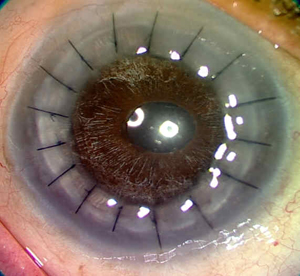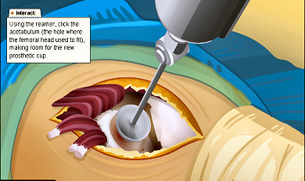Corneal Transplantation in India
Replacement of a clouded cornea is the only means of restoring full vision. If the rest of the eye (including the retina and optic nerve) is normal , the cornea is replaceable through transplant surgeries. The success rate of the advances in research and surgical techniques. Corneal transplantation is one of the most successful organ transplant surgeries. The success of the procedure depends on the amount and type of damage the eye has sustained from disease or injury. The success rate can be as high as ninety-five percent. However, it is important to remember that vision can be restored only to the extent that the other parts of the eye are normal .

Why the Procedure is Performed ?
Corneal transplantation is recommended for people who have:
- Vision problems caused by thinning of the cornea. This is called keratoconus.
- Scarring of the cornea from severe infections or injuries.
- Vision loss caused by cloudiness of the cornea. This is called Fuchs’ dystrophy.
Risks Sometimes, the body rejects the transplanted tissue. This occurs in a small number of patients.
Other risks for a corneal transplant are:
- Bleeding
- Infection of the eye
- Glaucoma (high pressure in the eye that can cause vision loss)
- Swelling of the front of the eye
The risks for any anesthesia are:
- Allergic reactions to medicines
- Breathing problems
Before the Procedure
Tell your doctor about any medical conditions you may have. Also tell you doctor what medicines you are taking, even drugs, supplements, and herbs you bought without a prescription.
You may need to limit medicines that make it hard for your blood to clot for 10 days before the surgery. Some of these are aspirin, ibuprofen (Advil, Motrin), and warfarin (Coumadin).
You may take your other daily medicines the morning of your surgery. But check with your doctor if you take diuretics (water pills) or insulin or pills for diabetes.
You will need to stop eating and drinking most fluids after midnight the night before your surgery. You can have water, apple juice, and plain coffee or tea (without cream or sugar) up to 2 hours before surgery. Do not drink alcohol 24 hours before or after surgery.
On the day of your surgery, wear loose, comfortable clothing. Do not wear any jewelry. Do not put creams, lotions or makeup on your face or around your eyes.
The Procedure
Only the central portion of the cornea is involved in transplantation .The surgeon excises an appropriate circular disc of the patient’s cornea and replaces it with a similarly sized disc of donor cornea, which is then sutured into place.
Tissue Availability
Corneas for transplant come from individuals who have donated their eyes for use after their death ,for the benefit of others. Donor corneal tissue can be used up to maximum of 4 days after the death of the donor depending on the modality of preservation. This includes screening for AIDS .Since Clear Vision Eye Centre is a recognised eye bank, we are able to network with other eye banks. This enables us to obtain quality tissue for our patients with minimum waiting period.
With a few exception, donor tissue up to age seventy years is usable. Factors such as sex, color of the iris, previous vision of the donor have no influence on the final outcome of the surgery. anyone wishing to be an eye donor should call the nearest Eye bank and pledge the same.
Risks in Corneal Transplant Surgery
As with any eye surgery, there is the possibility of loss of sight in the eye, loss of the entire eye or possible loss of life due to abnormal reactions to anesthesia. The risks are very small, but it is very important that you be aware that risks exist as with ant other surgical procedure.
Although cornea transplants are highly successful, unfortunately there can be no guarantees with corneal transplant surgery, just as there can be no guarantees with any other type of surgery. Some of the possible complications that could occur are infection, bleeding, glaucoma, a wound leak, poor wound healing, and failure or rejection of the transplant. If a transplant should fail, it does not mean blindness or loss of the eye. Rather a subsequent transplant may be performed with a good chance of success.



